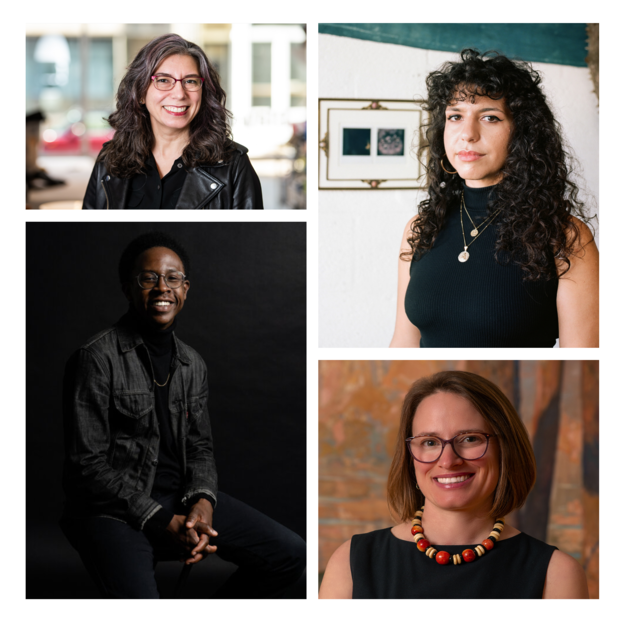Tyler Alumni Host Panel in Museum Life and Arts Administration

Tyler alumni Princeton Cangé (BFA '19), Laura Igoe (PhD ‘14), Victoria Ravelo (MFA ‘21), and Jennifer Zwilling (MA ‘01) held a panel titled “Museum Life: Careers in Arts Management” moderated by Dean Susan Cahan to discuss their backgrounds in art education, curation, making, and administration. They spoke primarily to Art History students and fielded questions about life after graduation, how to best secure job interviews, and unfiltered details about their current positions.
When considering the role of a curator, Igoe, who serves as the Chief Curator at the Michener Museum in Doylestown, explained that the scope of the job goes well beyond deciding what to exhibit. “There’s preservation involved, overseeing my staff of five, directing curatorial programs — both internal and traveling — directing acquisitions, and taking responsibility for the care, maintenance, and growth of the institution.”
Cahan, who previously worked as the Deputy Director and Curator of Education with the New Museum of Contemporary Art, agreed that “curators are often tapped to speak with donors because you have the expertise. You know why something is important, why something should be preserved.”
Jennifer Zwilling, Curator of Artistic Programs at The Clay Studio, spoke to the greater vision of non-profit arts organizations, as well as how to “serve Philadelphia’s artists and greater community through clay.” Having spent several years working with the Philadelphia Museum of Art in various curatorial assistant roles in the American, 20th Century Decorative Arts, and Contemporary Craft collections, her time with the PMA felt like an “honorary degree in museum studies.”
Cangé, a visual artist, is the Visitor Experience Supervisor with the Museum of Contemporary Art Chicago, and his role includes facilitating lectures, observing gallery functions, collecting memberships, and hosting museum tours. He spoke about the community aspect of working in a customer-facing job with MCA, and how the job offers “stability and opportunities. Everyone on staff is an artist, writer, actor, or creator in some way. It feels like a cultural hub.”
Ravelo, who is the Digital and Interpretive Content Assistant with the Pérez Art Museum Miami, emphasized the sense of community at her institution, though she prefers to keep her work and her practice separate. “I enjoy having a day job that is not creative. As artists, our means of making can also be in shaping these institutions.” Ravelo has shown work with Locust Projects Miami and a biennial exhibition with Project Row Houses.
Several points stressed included the importance of salary transparency, stability, and maintaining a strong professional network. Immediately after graduating, Cangé accepted a part-time role in Tyler’s Communications department and an internship with The Fabric Workshop and Museum, which later landed him an internship with The Studio Museum in Harlem, penultimately leading him to move to Chicago to work with MCA through a connection to the museum. He stressed the importance of networking. “I’m really lucky for a lot of the opportunities I’ve had,” he said. Ravelo, who entered the professional field after pursuing her MFA, had a slightly easier time navigating her post-grad job search. “I already had a wide net of people that I stayed in touch with to fall back on when I was looking for a job. Sometimes, it’s about who you know,” she said.
When asked about how to best approach job applications and interviews, Igoe stressed the importance of “informational interviews,” and reaching out to professionals in your field and desired role and asking to talk with them about their work, a key component to building a network of like-minded individuals who will support your career in the future.
The overarching theme of Zwilling, Igoe, Cangé, and Ravelo’s varied experiences was the necessity to advocate for themselves, and not settling for a role that they felt wasn’t the best fit for them despite the precariousness of working in a museum space, a point Cahan also made to the panel. “Each of you did things to increase your chances of getting a job at the best place for you, whether that was through networking, or being an active member of your arts community,” she said.